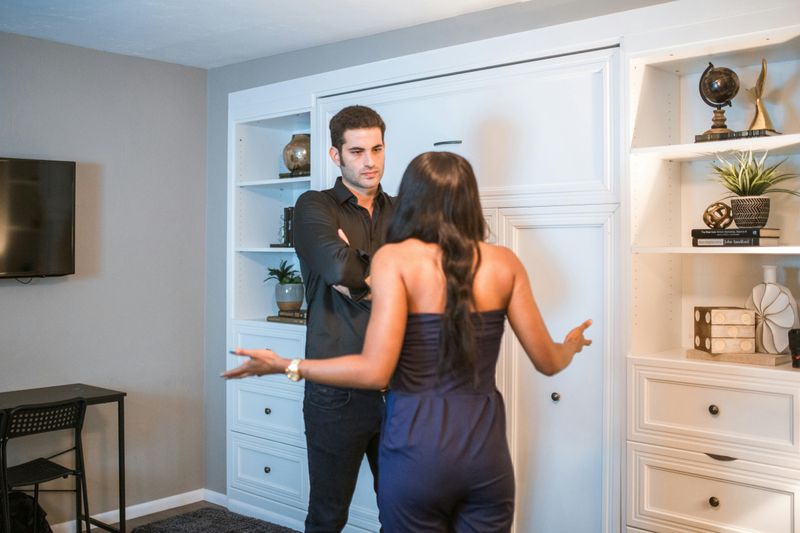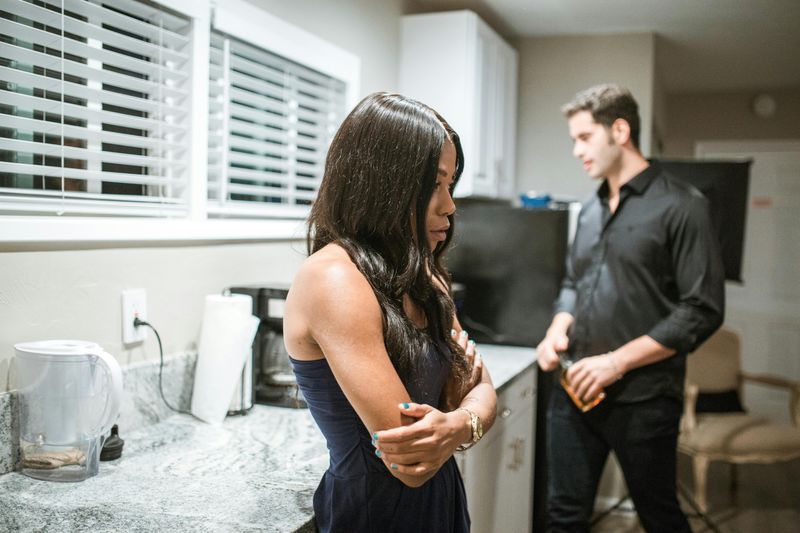14 Emotional Habits That Keep You Attracted to the Wrong People

Falling for the wrong person can feel like a pattern you can’t break. You might wonder why you keep choosing partners who hurt you or leave you feeling empty.
The truth is, certain emotional habits quietly guide your choices, often without you realizing it. Understanding these habits is the first step toward building healthier, happier relationships.
1. Confusing Drama with Passion

Excitement shouldn’t come from constant fighting or chaos. When relationships feel like a roller coaster, with extreme highs and crushing lows, it’s easy to mistake that intensity for love. Your heart races, emotions run wild, and you feel alive in the moment.
Real love, however, brings stability and peace alongside joy. Drama might seem thrilling at first, but it exhausts you over time. Healthy passion includes respect, trust, and calm moments together.
If you grew up watching unstable relationships, you might think turmoil equals caring. Breaking this habit means learning that genuine connection doesn’t require constant conflict to feel real or meaningful.
2. Seeking Validation from Others

Relying on someone else to make you feel worthy creates an unhealthy dependency. When your self-esteem depends on compliments, attention, or approval from a partner, you become vulnerable to manipulation. You might chase people who withhold affection because their rare praise feels extra special.
This habit often develops when you didn’t receive enough encouragement growing up. You learned to look outward instead of building inner confidence. Unfortunately, the wrong people notice this need and use it against you.
Building self-worth from within takes practice. Start celebrating your own achievements and recognizing your value without needing constant reassurance from romantic interests.
3. Ignoring Red Flags Early On

Your gut feeling usually knows when something’s off, but you might talk yourself out of listening. Maybe they’re rude to servers, or they criticize your appearance disguised as a joke. These early warning signs reveal someone’s true character.
Many people ignore these moments because they want the relationship to work so badly. You make excuses, thinking everyone deserves a second chance or that you’re being too picky. This generosity backfires when small issues become major problems.
Trusting your instincts from the beginning protects your heart later. Red flags rarely disappear; they usually multiply. Respecting your own boundaries means walking away when someone shows you they’re not right.
4. Mistaking Intensity for Intimacy

Sharing your deepest secrets on the first date might feel like instant connection, but it’s often just oversharing. Some people create false intimacy quickly by being extremely vulnerable or demanding your life story immediately. This rush feels special because it’s different from typical small talk.
True intimacy develops gradually through consistent actions and shared experiences. Fast emotional intensity can be a manipulation tactic or a sign someone lacks healthy boundaries. They want to feel close without earning trust over time.
Slow down and let relationships unfold naturally. Real emotional closeness includes respect for pacing and comfort levels. Genuine partners won’t rush you into deep vulnerability before you’re ready.
5. Believing You Can Fix Someone

You’re not a rehabilitation center, and relationships aren’t repair projects. Seeing potential in someone struggling with addiction, anger issues, or commitment problems might make you feel needed. You think your love will inspire them to change into the person you know they could become.
This savior mentality often attracts people who aren’t ready or willing to grow. They enjoy your support without doing the hard work themselves. Meanwhile, you exhaust yourself trying to transform someone who hasn’t asked for help.
Real change comes from within, not from a partner’s efforts. You deserve someone who’s already doing their own emotional work, not someone who needs constant rescuing from themselves.
6. Repeating Familiar Patterns

Your brain finds comfort in what feels familiar, even when it’s harmful. If your first experience with love involved neglect or inconsistency, you might unconsciously seek similar dynamics as an adult. The pattern feels like home, even though it hurts.
You might notice you keep dating the same type of person with different faces. They have similar traits, behaviors, or problems. This repetition isn’t coincidence; it’s your subconscious trying to resolve old wounds through new relationships.
Breaking free requires awareness and intentional choices. Notice what feels comfortable versus what’s actually healthy. Sometimes the right person feels unfamiliar at first because you’re used to dysfunction disguised as love.
7. Prioritizing Chemistry Over Compatibility

Physical attraction grabs your attention, but shared values keep relationships strong. That electric feeling when you meet someone new can blind you to fundamental differences. You overlook that they want different futures, have opposing life goals, or don’t share your core beliefs.
Chemistry creates sparks, but compatibility builds fires that last. You can’t sustain a relationship on attraction alone when you disagree about money, family, religion, or lifestyle choices. Eventually, the initial excitement fades, revealing the incompatibility underneath.
Smart dating means assessing both factors honestly. Ask important questions early instead of hoping differences won’t matter. The butterflies should accompany alignment, not replace it completely in your decision-making process.
8. Avoiding Being Alone

Many people settle for the wrong person simply because they’re scared of being alone. When your own company feels unbearable, any kind of relationship seems better than none. Before you know it, you’re hopping from one partner to the next without taking a pause to heal.
This habit prevents you from developing a solid relationship with yourself first. You miss the opportunity to discover your own interests, values, and dreams. Instead, you define yourself through whoever you’re dating at the moment.
Learning to enjoy solitude transforms your dating life completely. Comfortable people attract healthier partners because they choose relationships from desire, not desperation. Spend time alone building a life you love before inviting someone to share it.
9. Romanticizing Unavailable People

The person who’s always busy, emotionally distant, or in another relationship somehow becomes irresistible. Their unavailability creates mystery and challenge, making you want them more. You fantasize about finally winning their affection, convinced you’ll be the exception.
This attraction often stems from low self-worth or fear of real intimacy. Chasing unavailable people feels safer because deep down, you know it won’t work out. You never have to risk genuine vulnerability or face relationship challenges.
Available, interested people might seem boring by comparison, but they’re actually offering something real. Stop chasing ghosts and appreciate those who consistently show up. Mystery shouldn’t be confused with emotional unavailability or disrespect.
10. Ignoring Your Own Needs

Constantly putting someone else first erases your identity and breeds resentment. You cancel plans with friends, abandon hobbies, or compromise your values to keep a partner happy. Your needs become background noise while theirs take center stage.
This self-neglect attracts takers who enjoy the arrangement without reciprocating. They grow comfortable with your endless giving and never learn to consider your feelings. You become exhausted and empty, wondering why you feel so unfulfilled.
Healthy relationships require two people meeting each other halfway. Your needs matter just as much as your partner’s desires. Practice stating your preferences clearly and choosing partners who respect them without making you beg.
11. Equating Jealousy with Love

Possessiveness isn’t romantic; it’s controlling and unhealthy. When someone monitors your phone, questions your friendships, or gets angry about your independence, that’s not love. These behaviors reveal insecurity and a desire to control rather than trust you.
Some people mistake these actions for caring because movies and songs romanticize jealousy. You might even feel flattered initially, thinking their jealousy proves how much they care. In reality, it shows they don’t respect your autonomy.
Love includes trust and freedom, not surveillance and accusations. Healthy partners feel secure in the relationship without needing constant proof. If someone’s jealousy makes you feel trapped or monitored, that’s a sign to reconsider the relationship’s foundation.
12. Settling for Breadcrumbs

Accepting minimal effort because you’re afraid of losing someone completely destroys your self-respect. They text occasionally, make vague plans that fall through, or only contact you late at night. You celebrate these tiny gestures like they’re grand romantic displays.
This pattern happens when you believe small attention is better than nothing. You lower your standards drastically, hoping they’ll eventually offer more. Meanwhile, they learn they can keep you around with virtually no investment.
You deserve someone’s full attention, not their leftover energy. Stop accepting part-time effort from people who want full-time benefits. Walk away from breadcrumbs and wait for someone offering the whole meal consistently and enthusiastically.
13. Carrying Unresolved Past Trauma

Old wounds influence new relationships more than you realize. Betrayal, abandonment, or abuse from your past creates defense mechanisms and fears that affect current dating choices. You might push good people away or cling to bad ones, repeating cycles you don’t understand.
Unhealed trauma makes you vulnerable to people who trigger familiar pain. Your subconscious seeks to resolve old issues through new partners, but this strategy never works. Instead, you recreate painful dynamics, hoping for different outcomes.
Healing requires professional support and honest self-reflection. Therapy helps you process past experiences so they stop controlling your present choices. Addressing your history frees you to build healthier relationships based on current reality, not past pain.
14. Believing Love Requires Suffering

If you think real love must be difficult and painful, you’ll tolerate unacceptable behavior. Some people learn that love equals sacrifice, struggle, and constant work. They believe easy relationships lack depth or that suffering proves your commitment.
This belief attracts partners who create unnecessary drama and hardship. You stay through disrespect, lies, or mistreatment, thinking you’re being loyal and strong. The relationship becomes a test you’re determined to pass, regardless of the cost.
Love should add to your life, not drain it constantly. Healthy relationships involve effort, but they shouldn’t feel like endless suffering. Choose partners who make your life better, not harder, and redefine love as supportive rather than painful.

Comments
Loading…